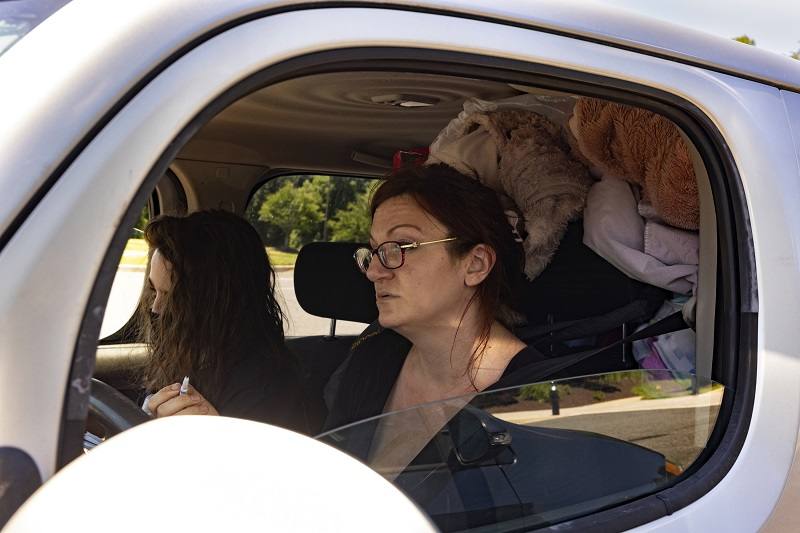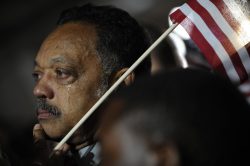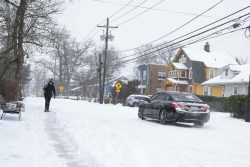
Sabrina Barger-Turner and her older son, Aiden Turner, 13, go through her to-do list on June 30 in Abingdon, Md. She was unable to pick up prints she had ordered from the Abingdon Public Library because they asked for a library card number, for which she is not eligible. Print sales are one of Barger-Turner’s sources of income.
17:55 JST, July 4, 2022
The sheriffs arrived at 6 a.m. in early June to tell Josanne English what she already knew: She was being evicted.
She’d lost her job as a project manager near Sacramento in April, then fallen behind on rent as $6-gallon gas and higher costs for food and utilities depleted her monthly budget. By the time she lost her home two months later, she owed $9,160 in rent and late fees, and her bank account was nearing zero.
She received $1,300 in housing assistance from the county, but that didn’t go very far in an area where the average asking rent has ballooned to nearly $2,800 a month. After a week in a hotel, English and her partner sent their three children to live with relatives while they slept in their Hyundai SUV and showered at the gym.
“I made good money – last year I made almost $100,000 – and I can’t believe this happened to me,” she said. “But with prices the way they are, it can literally happen to anybody.”
Rising housing costs, combined with persistent inflation for basic necessities such as gas and food, have left more Americans newly homeless and millions more fearing they’ll soon lose their homes. Shelters across the country are reporting a sudden increase in numbers of people looking for help as they struggle to cover basics. Inflation has reached 40-year highs just as many vulnerable families are readjusting to life without a boost from government stimulus or protections to keep them from being evicted.
A rise in homelessness is the latest example of a recovery further separating the haves from the have nots. Soaring house prices have allowed existing homeowners to see their wealth balloon. Meanwhile, for a growing number of Americans, simply finding a place to spend the night is becoming more expensive and out of reach.
“We’re in a very precarious moment, where the cost of living is going up so quickly – through the price of gas and food and rent – that more people can’t afford a place to live anymore,” said Meredith Greif, an assistant professor at Johns Hopkins University whose work focuses on homelessness and inequality. “Everywhere you turn, prices are rising, but wages aren’t keeping up.”
There is limited national data on how many people are unhoused, especially since the pandemic began. In January 2020, there were more than 580,000 people in America experiencing homelessness, according to the National Alliance to End Homelessness.
In interviews, shelter officials in 15 states nationwide all reported a dramatic increase in the number of people, particularly single mothers, seeking services this year. In some cases, waitlists have doubled or tripled in a matter of months.
In the past, homelessness has often befallen those going through hard times after losing a job or shouldering unexpected medical expenses or dealing with ongoing health problems. However, this time around, shelters say they’re seeing a rise in families who still have steady, even good-paying, jobs but cannot find a home they can afford.
That growing sense of despair is palpable at Atlanta Mission, a homeless shelter where more people are talking about inflation-related burdens when they walk in the door. “Evicted from my apartment due to being behind on rent. Sleeping outside,” one person responded on an intake questionnaire. “Unable to find housing that meets her income,” another wrote.
“Before, there was a pretty big discrepancy between people who were living paycheck to paycheck, and those who weren’t,” said Rachel Reynolds, communications manager for Atlanta Mission. “I can imagine that we’re going to continue to see different types of people coming to our doors based on the sheer cost of living.”

Sabrina Barger-Turner and her two sons, Aiden Turner and Gavin Barger, make cards at McDonald’s on June 30 in Abingdon, Md. She posts queries in online forums to see who might want a card that is uplifting or friendly.

Gavin Barger, Aiden Turner and their mother, Sabrina Barger-Turner, enter their hotel room in Towson, Md. They bring their own blankets and pillows to make each hotel room feel more like a home.
Sabrina Barger-Turner has been living in hotels in Harford County, Md., with her two sons since her lease was terminated in early March 2020 after she struggled to pay her rent on time. But she said rising nightly rates – combined with higher costs for gas and groceries – are making it difficult to afford even that, which means she’s spending more nights in her Nissan Cube while the kids, ages 8 and 13, stay with family.
Barger-Turner, 36, says it would be cheaper to pay a monthly lease than cobbling together $89-a-night hotels, but her credit score is dinged by her children’s medical debt. She lost her $60,000 a year accounting job shortly after her son was hospitalized with severe asthma in 2019. The piecemeal work she has picked up since then is barely enough to scrape by and keeps her from qualifying for a new apartment, she added.
Her food stamps recently lapsed because the renewal paperwork went to a defunct address. She sells homemade jewelry online and sometimes picks up delivery gigs for DoorDash, though she says skyrocketing gas prices have made that cost-prohibitive.

Aiden Turner writes a message on a card.
“There is nothing I want more than to give my kids a bed of their own, so they don’t have to live like this,” she said. “Today when we switched hotels, there was a downpour. I tried to talk it up to them like it was an adventure, like this was fun. But this is anything but fun.”
Even among those who are still in their homes, the prospect of suddenly being displaced is creeping closer. An estimated 13.7 million Americans were behind on rent or mortgage payments in early June, up 7% from April, according to the Census Bureau’s Household Pulse Survey. Of those, 4.6 million adults say they are “somewhat likely” or “very likely” to lose their homes by eviction or foreclosure in the next two months, a 32% increase from early April.
Jeannie Jansen received foreclosure papers three weeks ago: She has until July 8 to pay $5,000 in overdue property taxes or she loses her home in western New York.
Jansen, 55, lives on $980 a month in Social Security disability payments. She said there’s no way to make the numbers work. She paid off her $48,000 mobile home in Wyoming, N.Y., years ago, but said she’ll likely be living in her Dodge Nitro SUV. Skyrocketing home values have lifted the median home price in her county by 16% in the past year, leaving her with higher property taxes just as groceries, gas and prescription medications have all gotten more expensive.
“If I lose my home, I’m going to fall further behind than ever,” said Jansen, who owned a cleaning company until she was diagnosed with a lung condition and immunodeficiency disorder in 2009. “I busted my butt for years to have what we have. I went without heat this winter. I’ve gone without everything. And it’s still not enough because prices are so high.”
Every $100 increase in median rent is associated with a 9% increase in the estimated homelessness rate, according to the a 2020 report by the U.S. Government Accountability Office. Economists say that figure is particularly troubling as rents continue to soar to unprecedented highs. The national median asking rent jumped to a record $2,002 in May, up 15% from $1,738 a year ago, according to Redfin.
For months, Venus Lopez had a work-from-home job but no home. Lopez, 35, was priced out of her Tucson apartment last October and moved into a Super 8 motel with her three sons. She tried to keep working, but the property’s spotty internet connection made it next to impossible. Last month, she lost her job; her bosses said they’d love to hire her back after she finds a permanent home.
Meanwhile, local rents have risen 22% from the beginning of the pandemic, making Lopez’s $1,100 budget feel increasingly impossible. She pays $483 a week for a motel room she shares with her sons, ages 3, 5 and 14, but is almost out of money. The few affordable places she’s found have months-long wait lists. She’s already borrowed money from her mother and a cousin, and has nowhere left to turn.
“With prices of everything going up, it’s becoming a challenge to even maintain what we have,” Lopez said. “Finding an affordable apartment keeps getting more unrealistic.”
The housing affordability crisis is on the minds of policymakers trying to rein in inflation. The Fed has begun aggressively raising interest rates in the hope of dampening the economy, including the housing market, to bring down prices. While there are already signs that higher mortgage rates have led to a cooling-off in home sales, economists say it will take much longer for that slowdown to trickle down to the rental industry.
For the Fed, the challenge will be getting control of soaring prices without inflicting even more pain.
“You can’t describe the average person experiencing this. And that’s what is often lost,” Mary Daly, president of the Federal Reserve Bank of San Francisco, told The Post. “We cannot forget that a lot of these people were displaced and disrupted for literally no fault of their own. A pandemic came and it made everything more precarious, and then there’s the everyday precariousness.”
Experts say that about 20% of people without a home are considered chronically homeless and living on the streets or in shelters. The vast majority lack a permanent address but are patching together living arrangements however they can.
“Once you’re out of housing, even if you’re living in your own car, you’ve already fallen off the cliff,” said Greif of Johns Hopkins. “You don’t have a permanent address or a bed or a place to shower anymore, and that makes everything else harder. All of the basics in life start to disappear.”
Most people experiencing homelessness are able to find housing within a year, she said. But even then, being displaced, however briefly, can easily trigger other major setbacks, such as job loss and long-term financial uncertainty.
English, the laid-off project manager evicted in Sacramento, found a new administrative job at a construction company. But she was often late to work and distracted because of her living situation. When she finally told her boss she had been sleeping in her car, he gave her a $6,000 advance to cover a deposit on a new apartment. On Saturday, she and her family moved into a three-bedroom rental that costs $2,500 a month.
Even so, things have been difficult. She has depleted her savings and stocks, and she doesn’t get her next paycheck until Tuesday. In the meantime she’s been bouncing checks to fill up her gas tank. Her checking account is overdrawn by $436.
“I thought everything would be fine once I got housed, but it’s not,” she said. “I’m depressed. …We are literally starting over from scratch.”
In Springfield, Mo., Jordan Evans and her husband have been living in their 2012 Honda CRV after being evicted on June 7. They sleep in a Home Depot parking lot.
Evans applied to move into a studio where the rent is $800 a month. Rents in the area rose 9% since the pandemic began, according to CoStar Group data. But even if they hear back, they can’t afford it. Evans has worked a handful of retail and housekeeping jobs since the pandemic, but fear of getting sick and cutback hours have slashed her income. She and her husband, who has a type 1 diabetes, shop at Walmart for groceries that can withstand the 90-degree heat: bagels, bags of chips, tuna packets. McDonalds or Taco Bell are options “if we can afford it,” Jordan said. They can’t justify paying $158 for window coverings, which means she sometimes wakes up to people peering into the car.
“Some apartments have gone up by $20 [per month], some by $150,” she said. “It’s really hard to find an apartment just in Missouri in general. And in the 20 days we’ve been living in our car, we’ve noticed so many other people living out of their cars, as well.”
Friday was Evans’s 23rd birthday. She traveled to Arkansas to be with her sister – and avoid spending a 24th night in her car.
Top Articles in News Services
-

Prudential Life Expected to Face Inspection over Fraud
-

Hong Kong Ex-Publisher Jimmy Lai’s Sentence Raises International Outcry as China Defends It
-

Japan’s Nikkei Stock Average Touches 58,000 as Yen, Jgbs Rally on Election Fallout (UPDATE 1)
-

Trump Names Former Federal Reserve Governor Warsh as the Next Fed Chair, Replacing Powell
-

Survey Shows False Election Info Perceived as True
JN ACCESS RANKING
-

Japan PM Takaichi’s Cabinet Resigns en Masse
-

Japan Institute to Use Domestic Commercial Optical Lattice Clock to Set Japan Standard Time
-

Israeli Ambassador to Japan Speaks about Japan’s Role in the Reconstruction of Gaza
-

Man Infected with Measles May Have Come in Contact with Many People in Tokyo, Went to Store, Restaurant Around When Symptoms Emerged
-

Prudential Life Insurance Plans to Fully Compensate for Damages Caused by Fraudulent Actions Without Waiting for Third-Party Committee Review




















